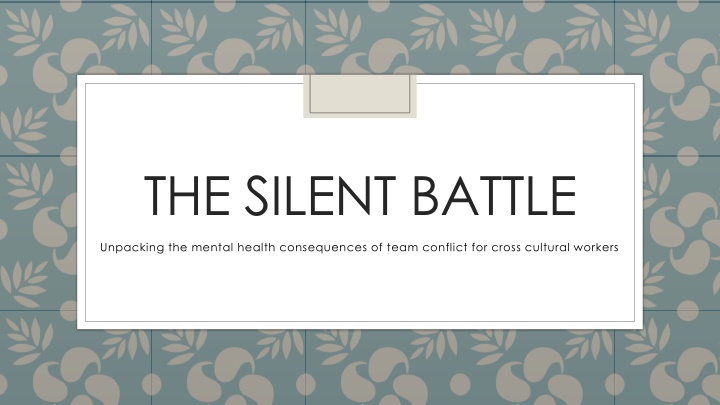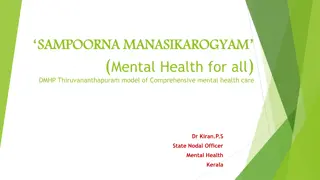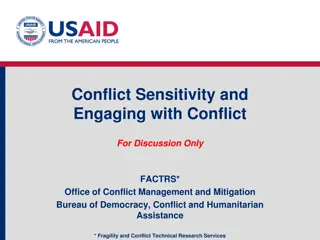Unpacking the Mental Health Consequences of Team Conflict for Cross-Cultural Workers
This content delves into the silent battle of unpacking the mental health consequences of team conflict for cross-cultural workers. It discusses causes of conflicts, the relationship attachment model, traits of problematic individuals, other conflict triggers, impacts of conflict, and navigating conflicts through self-awareness and good conflict resolution skills.
Download Presentation

Please find below an Image/Link to download the presentation.
The content on the website is provided AS IS for your information and personal use only. It may not be sold, licensed, or shared on other websites without obtaining consent from the author.If you encounter any issues during the download, it is possible that the publisher has removed the file from their server.
You are allowed to download the files provided on this website for personal or commercial use, subject to the condition that they are used lawfully. All files are the property of their respective owners.
The content on the website is provided AS IS for your information and personal use only. It may not be sold, licensed, or shared on other websites without obtaining consent from the author.
E N D
Presentation Transcript
THE SILENT BATTLE Unpacking the mental health consequences of team conflict for cross cultural workers
Relationship Attachment Model KNOW Talk, Togetherness, Time TRUST RELY COMMIT A safe relationship never goes further in one bonding area than you have gone in the previous. This rule is based on the view that the five bonding dynamics have a specific order and logic to them: what you know about a person determines the degree you should trust him or her; this trust directs you in choosing what personal needs you can rely on him or her to meet; you should become committed only to the extent that you know, trust, and depend on that person. How to Avoid Falling in Love with a Jerk (p. 24). McGraw Hill LLC. Kindle Edition.
3 Common Traits of Problem People 1. Boundary Breaker/Space Invader- feels entitled to your attention, interest, time, and emotional support 2. Inability to see anything from someone else s perspective- of course this can happen once or twice but when a pattern emerges makes it difficult to sustain a long-term relationship 3. Lack of emotional controls/balance- failure to express emotions appropriately makes it difficult for them to build a healthy relationship and relate to others
Other Causes of Conflict Your past Miscommunication Not feeling heard Perceived lack of support Pride (stepping on toes) Unmet expectations/mission drift Feeling overworked and overburdened Feeling unappreciated
Impact of Conflict It takes 3 months for patterns of behavior to present Breakdown in communication Tension/Walking on eggshells Effects ministry Leads to a feeling of unsafety for everyone Actual unsafety for some if not all Potential spiritual abuse (be wary)
Navigating Conflict Self Awareness of OUR story Good Listening posture: SOLER Square off make sure your shoulders are square with the person talking. Open keep your arms and legs uncrossed so that you have an open, non-defensive position. Lean lean forward toward the person talking. Eye contact keep eye contact with the person talking. Relax stay relaxed as you listen. Good conflict-resolution skills involve: Empathy Everyone vocalizing needs clearly A spirit of humility Willingness to forgive Personal and team resiliency 3rdParty when necessary
Creating a Healthy Team Communication a. Clear rules i. including channels for written and verbal ii. Listen first and empathize b. Grieving/lamenting as a team c. Celebrating as a team Sense of belonging a. Each member feels they have a roll not just that they are given but want to take on and are passionate about Boundaries a. what are my boundaries and am I allowing those be continually crossed. If I am, how can I be better at sticking to my own boundaries
Creating Healthy Team Culture KNOW: Prioritize this: talk, togetherness, time Listen to the same degree that you speak Recognize that your past significantly impacts how we do each and every thing. How we respond, what triggers us, when we become dysregulated in our bodies. Our past is playing into our teaming. The best thing we can do is deal with our past before it becomes our future. A NOTE TO SUPERVISORS: A supervisor s role is to empower and equip their people, not hold power and dictate the lives and jobs of their people.























